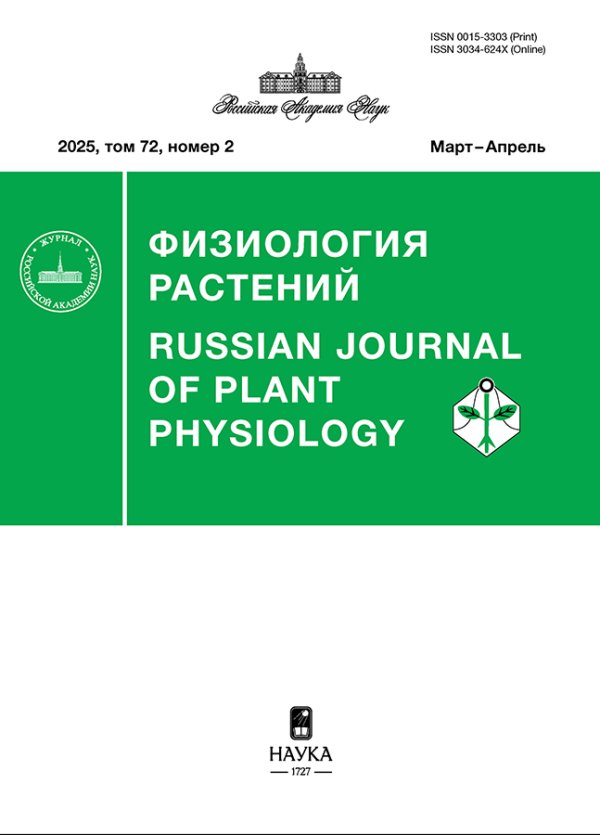Trans-Factor PTF1 Participates in the Response to Salinity but Does Not Regulate Expression of the psbD Gene in Arabidopsis thaliana
- Authors: Andreeva A.A.1, Bychkov I.A.1, Kudryakova N.V.1, Kuznetsov V.V.1
-
Affiliations:
- Timiryazev Institute of Plant Physiology, Russian Academy of Sciences
- Issue: Vol 70, No 1 (2023)
- Pages: 80-90
- Section: ЭКСПЕРИМЕНТАЛЬНЫЕ СТАТЬИ
- URL: https://journals.rcsi.science/0015-3303/article/view/130212
- DOI: https://doi.org/10.31857/S0015330322600334
- EDN: https://elibrary.ru/ALLDSG
- ID: 130212
Cite item
Full Text
Abstract
The existing data on the role of PTF1/TCP13 belonging to the TCP family of transcription factors in regulating expression of a psbD plastid gene encoding a D2 protein of PSII are controversial. To analyze biological functions of PTF1/TCP13, transformed plants expressing PTF1/TCP13 under a β-estradiolinducible promoter were used. PTF1/TCP13 overexpression did not provide the expected increase in the accumulation of psbD transcripts transcribed from BLRP (Blue Light Responsive Promoter), though their level significantly increased under exposure to light or abscisic acid (ABA). PTF1/TCP13 was up-regulated by ABA; moreover, genes of the canonic pathway of the ABA signal transduction were involved in the regulation of PTF1/TCP13 expression. In addition, PTF1/TCP13 was induced in response to salt stress However, in the overexpressing line, salt tolerance and expression of salt stress markers, as well as a number of genes for the synthesis and signaling of ABA, were reduced compared to plants with the normal level of expression of this transcription factor, that is, PTF1/TCP13 acted as a negative regulator of salt stress Thus, PTF1 does not belong to plastid transcription factors. Nevertheless, it represents one of the components of the ABA-dependent regulatory chain capable of modifying expression of nuclear and chloroplast genes in response to changes in homeostasis.
Keywords
About the authors
A. A. Andreeva
Timiryazev Institute of Plant Physiology, Russian Academy of Sciences
Email: nvkudryakova@mail.ru
Russian Federation, Moscow
I. A. Bychkov
Timiryazev Institute of Plant Physiology, Russian Academy of Sciences
Email: nvkudryakova@mail.ru
Russian Federation, Moscow
N. V. Kudryakova
Timiryazev Institute of Plant Physiology, Russian Academy of Sciences
Author for correspondence.
Email: nvkudryakova@mail.ru
Russian Federation, Moscow
V. V. Kuznetsov
Timiryazev Institute of Plant Physiology, Russian Academy of Sciences
Email: nvkudryakova@mail.ru
Russian Federation, Moscow
References
- Wagner R., Pfannschmidt T. Eukaryotic transcription factors in plastids – bioinformatic assessment and implications for the evolution of gene expression machineries in plants // Gene. 2006. V. 381. P. 62. https://doi.org/10.1016/j.gene.2006.06.022
- Schwacke R., Fischer K., Ketelsen B., Krupinska K., Krause K. Comparative survey of plastid and mitochondrial targeting properties of transcription factors in Arabidopsis and rice // Mol. Genet. Genomics. 2007. V. 277. P. 631. https://doi.org/10.1007/s00438-007-0214-4
- Baba K., Nakano T., Yamagishi K., Yoshida S. Involvement of a nuclear-encoded basic helix-loop-helix protein in transcription of the light-responsive promoter of PsbD // Plant Physiol. 2001. V. 125. P. 595. https://doi.org/10.1104/pp.125.2.595
- Kodama Y. Plastidic proteins containing motifs of nuclear transcription factors // Plant Biotechnology. 2007. V. 24. P. 165. https://doi.org/10.5511/plantbiotechnology.24.165
- Kodama Y., Sano H. A comparative analysis of basic helix-loop-helix proteins, AtPTF1 and NtWIN4, with reference to plastid localization // Plant Biotech. 2007. V. 24. P. 335. https://doi.org/10.5511/plantbiotechnology.24.335
- Yamburenko M.V., Zubo Y.O., Börner T. Abscisic acid affects transcription of chloroplast genes via protein phosphatase 2C-dependent activation of nuclear genes: repression by guanosine-3-′5′-bisdiphosphate and activation by sigma factor 5 // Plant J. 2015. V. 82. P. 1030. https://doi.org/10.1111/tpj.12876
- Zabala M.T., Littlejohn G., Jayaraman S., Studholme D., Bailey T., Lawson T., Tillich M., Licht D., Bölter B., Delfino L., Truman W., Mansfield J., Smirnoff N., Grant M. Chloroplasts play a central role in plant defence and are targeted by pathogen effectors // Nat. Plants. 2015. V. 1. 15074. https://doi.org/10.1038/NPLANTS.2015.74
- Hur Y.-S., Kim J., Kim S., Son O., Kim W.-Y., Kim G.-T., Takagi M.O., Choong-Ill Cheon C. Identification of TCP13 as an upstream regulator of ATHB12 during leaf development genes // Genes. 2019. V. 10. P. 644. https://doi.org/10.3390/genes10090644
- Urano K., Maruyama K., Koyama T., Gonzalez N., Kazuko D.I., Shinozaki Y., Shinozaki K. CIN-like TCP13 is essential for plant growth regulation under dehydration stress // Plant Mol. Biol. 2022. V. 108. P. 257. https://doi.org/10.1007/s11103-021-01238-5
- Coego A., Brizuela E., Castillejo P., Ruíz S., Koncz C., Pozo J.C., Piñeiro M., Jarillo J.A., Paz-Ares J., León J. The TRANSPLANTA collection of Arabidopsis lines: a resource for functional analysis of transcription factors based on their conditional overexpression // Plant J. 2014. V. 77. P. 944. https://doi.org/10.1111/tpj.12443
- Danilova M.N., Kudryakova N.V., Doroshenko A.S., Zabrodin D.A., Rakhmankulova Z.F., Oelmüller R., Kusnetsov V.V. Opposite roles of the Arabidopsis cytokinin receptors AHK2 and AHK3 in the expression of plastid genes and genes for the plastid transcriptional machinery during senescence // Plant Mol. Biol. 2017. V. 93. P. 533. https://doi.org/10.1007/s11103-016-0580-6
- Belbin F.E., Noordally Z.B., Wetherill S.J., Atkins K.A., Franklin K.A., Dodd A.N. Integration of light and circadian signals that regulate chloroplast transcription by a nuclear-encoded sigma factor // New Phytol. 2017. V. 213. P. 727. https://doi.org/10.1111/nph.14176
- Bates L.S., Waldren R.P., Teare I.D. Rapid determination of free proline for water-stress studies // Plant Soil. 1973. V. 39. P. 205.
- Heath L.R., Packer L. Photoperoxidation in isolated chloroplasts. I. Kinetics and stoichiometry of fatty acid peroxidation // Arch. Biochem. Biophys. 1968. V. 125. P. 189.
- Nishiyama R., Watanabe Y., Fujita Y., Le D.T., Kojima M., Werner T., Vankova R., Yamaguchi-Shinozaki K., Shinozaki K., Kakimoto T., Sakakibara H., Schmülling T., Tran L.P. Analysis of cytokinin mutants and regulation of cytokinin metabolic genes reveals important regulatory roles of cytokinins in drought, salt and abscisic acid responses, and abscisic acid biosynthesis // Plant Cell. 2011. V. 23. P. 2169. https://doi.org/10.1105/tpc.111.087395
- Miyakawa T., Fujita Y., Yamaguchi-Shinozaki K., Tanokura M. Structure and function of abscisic acid receptors // Trends Plant Sci. 2013. V. 18. P. 259 https://doi.org/10.1016/j.tplants.2012.11.002
- Krupinska K., Blanco N.E., Oetke S., Zottini M. Genome communication in plants mediated by organelle–nucleus-located proteins // Phylosophical transection of the royal society. 2020. V. 375. 20190397. https://doi.org/10.1098/rstb.2019.0397
- Ding S., Zhang Y., Hu Z., Huang X., Zhang B., Lu Q., Wang Y., Lu C. mTERF5 acts as a transcriptional pausing factor to positively regulate transcription of chloroplast psbEFLJ // Mol. Plant. 2019. V. 12. P. 1259. https://doi.org/10.1016/j.molp.2019.05.007
- Zhang Y., Cui Y.L., Zhang X.L., Yu Q.B., Wang X., Yuan X.B., Qin X.M., He X.F., Huang C., Yang Z.N. A nuclear-encoded protein, mTERF6, mediates transcription termination of rpoA polycistron for plastid-encoded RNA polymerase-dependent chloroplast gene expression and chloroplast development // Sci. Rep. 2018. V. 8. 11929. https://doi.org/10.1038/s41598-018-30166-6
- Tsunoyama Y., Ishizaki Y., Morikawa K., Kobori M., Nakahira Y., Takeba G., Toyoshima Y., Shiina T. Blue light-induced transcription of plastid-encoded psbD gene is mediated by a nuclear-encoded transcription initiation factor, AtSig5 // Proc. Natl. Acad. Sci. USA. 2004. V. 101. P. 3304. https://doi.org/10.1073/pnas.0308362101
- Lerbs-Mache S. Function of plastid sigma factors in higher plants: regulation of gene expression or just preservation of constitutive transcription? // Plant Mol. Biol. 2011. V. 76. P. 235. https://doi.org/10.1007/s11103-010-9714-4
- Cackett L., Cannistraci C.V., Meier S., Ferrandi P., Pěnčík A., Gehring C., Novák O., Ingle R.A., Donaldson L. Salt-specific gene expression reveals elevated auxin levels in Arabidopsis thaliana plants grown under saline conditions // Frontiers in Plant Science. 2022. V. 13. 804716. https://doi.org/10.3389/fpls.2022.804716
Supplementary files
















